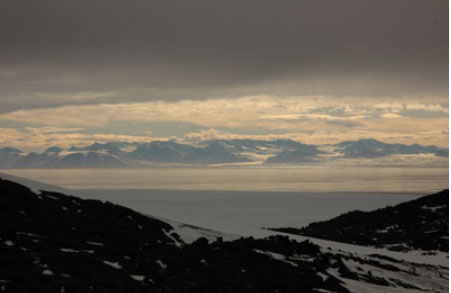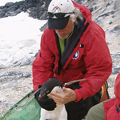Thanksgiving at the Penguin Colony
CAPE ROYDS, ANTARCTICA– Well, let’s see, it was chicken and oriental rice for Thanksgiving dinner yesterday eve, and a rousing blizzard outside. Only in the evening, though. As I mentioned before, there’s a lot of open water in McMurdo Sound this spring, and the reason is related to the frequent blasts of wind that blow the ice away. In fact we had only one period of maybe 6 hours thus far when it’s been calm. Peak wind so far has been around 50 knots.

Here’s the view from the front window of the RacTent, looking west toward Victoria Land (Antarctic continent). McMurdo Sound is the stretch from here, the shore of Ross Island, to the mountains in the distance. The silver-gray area is open water; the white in the nearer area is the outer portion of the McMurdo Sound fast ice, the edge being about 1 km away. So, the penguins must be happy having the sea this close so early in the breeding season. They are not expecting open water now. In fact, their breeding strategy is set up to cope with treks over ice by the females, after they lay the eggs. The males have put on enough fat to sit waiting for about two weeks for the females to return. I’ve already seen several nest reliefs, as well as birds coming back and the mate not wanting to get off the eggs. Their hormones are elevated, which makes them want to sit as long as they are not hungry.
I’ve encountered about 80 banded, known birds thus far. All had hatched and were originally banded at Royds except one, a male who originated from Cape Crozier. Of those 80, about 50 are the owners of a nest with eggs, laid by them or their partner. That’s a record for Royds, breaking last year’s record of 30 nests of banded birds. The reason such a high proportion of banded birds so far have eggs, and more are likely coming in the next couple of days, is that the population has aged. All the banded birds are 7 years old or older. The oldest of the banded ones, is 13 years. There are no younger ones because in the past 5 years, when McMurdo Sound was covered along its length by fast ice (more later on that), they were discouraged from coming (walking) this far. Many went only as far as Cape Bird out at the northern edge of McMurdo Sound, where they found a nest site near open water. In any case, the peak of laying has now happened here at Royds. Mostly there are just single birds on nests, happily incubating their eggs. Their partners have gone off to sea to eat. The colony is very quiet.

 No comments
No comments 






